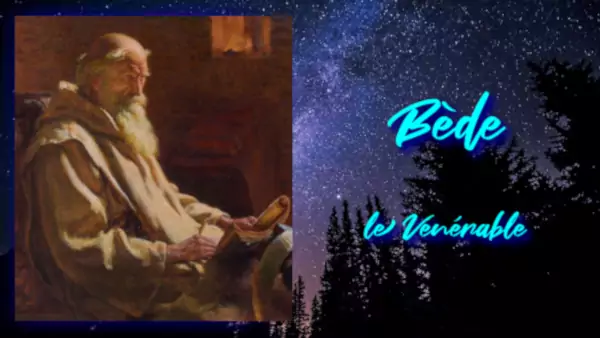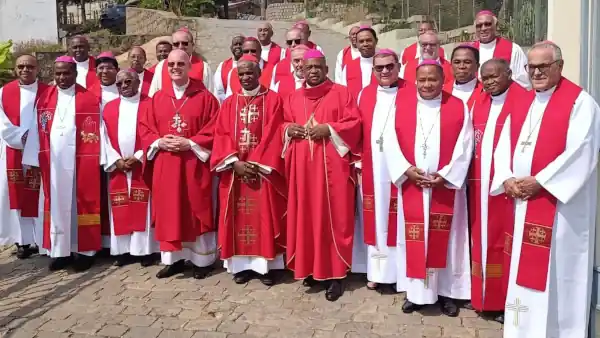25 May - Bède, known as the Venerable (in Latin: Beda Venerabilis), is an Anglo-Saxon monk and scholar born around 672/673 in Northumbria and died on 26 May 735. At the age of seven, Bede was sent to the monastery of Wearmouth by his family to receive the teaching of Benedict Biscop, then Ceolfrith.
Around 692, Bède, aged nineteen, was ordained deacon by his diocesan bishop, Jean, Bishop of Hexham. The canonical age for ordination to the diaconate is 25; the fact that Bède was ordained earlier may imply that he is considered to be endowed with exceptional qualities. At the age of thirty, around 702, he became a priest, ordained again by Bishop John.
Around 701, Bède wrote his first works, the De Arte Metrica and the De Schematibus et Tropis, both intended as teaching aids. He continued to write until his death, producing more than 60 books, most of which have survived. Not all of them are easy to date, and some may have been written over a period of several years. His last known text is a letter to Egbert of York, one of his former students, written in 734.
A Greek and Latin manuscript of the Acts of the Apostles from the 6th century, the Codex Laudianus, which is believed to have been used by Bède, remains in the Bodleian Library. Bède may also have worked on one of the Latin Bibles that were copied at Jarrow, one of which is currently kept in the Laurentian Library in Florence. Bède is a teacher as well as a writer; he loves music, and is said to excel in singing and declamation of poetry in the vernacular. It is possible that he suffered from a pronunciation defect, but this hypothesis is based on the uncertain interpretation of a passage from the introduction of his life in verse by St. Cuthbert: per linguae curationem may mean that he was cured of a pronunciation defect, or simply that he was inspired by the saint's works.
In 708, Bède was accused of heresy by monks from Hexham Abbey for his work De Temporibus. At the time, the theory of the six ages of the world prevailed, but Bède, rather than accepting the authority of Isidore of Seville, calculated the age of the world and estimated that Christ was born 3952 years after the creation of the world, whereas the theologians of the time agreed on a number of years greater than 5000. This accusation was made before the Bishop of Hexham Wilfrid during a banquet by drunken monks. Wilfrid does not answer it, but a monk present at the time reports the affair to Bède, who replies a few days later with a letter in which he presents his defence, asking that it also be read to Wilfrid. Bède had a quarrel with Wilfrid another time, because the historian himself claims to have met him once between 706 and 709. The two men speak of Æthelthryth, abbess of Ely, at the exhumation of whose body Wilfrid attended in 695. Bède asks the bishop about the exact state of the body and asks for more details about the life of the deceased, of whom Wilfrid had been an adviser.
In 733, Bède went to York to visit Bishop Egbert. As the seat of York was elevated to the rank of archbishopric in 735, it is likely that the two men discussed the matter during Bède's visit. He also went to the monastery of Lindisfarne, and on an unknown date visited a monk named Wicthed in an otherwise unknown monastery, a visit mentioned in a letter to this monk. The letters sent by Bède to correspondents throughout Great Britain, many of which suggest that Bède met them, suggest that Bède also travelled to other places, without it being possible to guess where or when. Nevertheless, it seems certain that he never went to Rome, for such a trip would certainly have been mentioned in the autobiographical chapter of his Historia Ecclesiastica28.
Bède hopes to be able to visit Egbert again in 734, but illness prevents him from making the trip. He died during the night of Wednesday to Thursday 26 May 735, Ascension Day, and was buried at Jarrow. A letter written by Cuthbert, a disciple of Bède, to a certain Cuthwin, relates the last days of Bède. According to him, Bede fell ill before Easter, and on the Tuesday before Ascension Day, his condition worsened rapidly. However, he continued to dictate to a scribe, stayed awake all night to pray and continued to dictate the next day. At three o'clock, he asks for a box to be brought to him and distributes some treasures to the monks of the monastery: a little pepper, doilies and a little incense. Later, he dictates a last sentence to his scribe, a young boy named Wilberht, and dies shortly afterwards.








